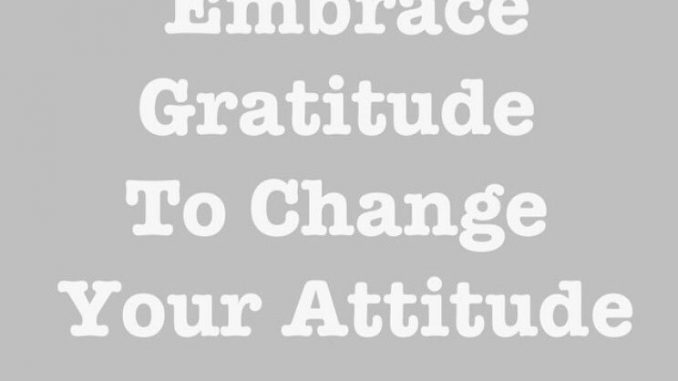
Gratitude Defined
The Webster Dictionary defines gratitude as “an emotion of the heart, excited by a favor or benefit received; a sentiment of kindness or goodwill towards a benefactor; thankfulness.” Webster dictionary goes on to define gratitude as an agreeable emotion, consisting in or accompanied with good will to a benefactor, and a disposition to make a suitable return of benefits or services, or when no return can be made, with a desire to see the benefactor prosperous and happy.” (Webster Dictionary)
One of the world’s leading scientific experts on gratitude, Dr. Robert Emmons, takes the definition of gratitude further and describes it using two key components:
- The first part of gratitude is “an affirmation of goodness. We affirm that there are good things in the world, gifts, and benefits we’ve received.” (Greater Good essay, “Why Gratitude Is Good”)
- The second part of gratitude is our recognition “that the sources of this goodness are outside of ourselves. … We acknowledge that other people—or even higher powers, if you’re of a spiritual mindset—gave us many gifts, big and small, to help us achieve the goodness in our lives.” (Greater Good essay, “Why Gratitude Is Good”)
Check out Dr. Emmon’s video for more on what gratitude is:
Evidence-Based Benefits of Gratitude
Hundreds of studies have documented a wealth of social, physical, psychological and brain-based benefits of gratitude for nearly anyone of all ages, both adults and children. Here are many of the benefits of practicing gratitude and making it a regular habit, which is backed by research:
- Increases happiness, joy, pleasure, enthusiasm, and other positive emotions
- Improves satisfaction with one’s life
- Boosts feelings of optimism and hopefulness
- Reduces anxiety and depression, even within those with chronic diseases
- Strengthens the immune system
- Lowers blood pressure
- Reduces symptoms of illness
- Makes us less bothered by aches and pains
- Encourages us to exercise more and take better care of our health, as happier people are more proactive about their health
- Improves sleep time and sleep quality
- Builds resiliency, for both daily life difficulties and more serious events such as PTSD
- Strengthens relationships, with family members, romantic partners, and friends
- Promotes forgiveness when we’ve been wronged and remorse (apologizing) when we have wronged
- Attracts others to us and makes us more likable
- Increases decision-making abilities
- Improves productivity
- Improves personality
- Reduces self-centeredness
- Decreases materialism
- Increases spirituality and connection to a higher power
- Improves self-esteem
- Results in living longer
- Reduces feelings of envy
- Helps us relax
- Deepens relationships
- Improves management abilities
- Helps improve networking
Gratitude encourages us not only to appreciate things in our lives but also inspires us to repay it to others. Therefore, another benefit of gratitude is it:
- Multiplies our pro-social behaviors and altruistic spirit, the feeling of wanting to help others and pay good forward
Gratitude also has a wealth of pro-social benefits for youth, schools, and families. Some of these have been listed above and here are more related to these specific populations:
-
It’s good for kids
-
- Decreases selfishness
- Increases expression of kindness
- Increases generosity
- Improves self-esteem and self-confidence
- Enhances resiliency to cope with stress and adversity
- Builds more connection to others and the community
-
It’s good for schools
-
- Improves student’s feelings about school which impacts grades, mood, and attendance
- Improves teacher satisfaction and sense of accomplishment
- Decreases teacher burnout
-
It’s good for families
-
- Strengthens family relationships
- Helps marriages
- Improves parenting
- Produces grateful children
Brain Benefits
As a Board Certified Neurotherapist, I would be remiss if I did not mention at least some of the brain benefits of practicing gratitude:
- Helps rewire the brain
- Reprograms the mind, from negative to positive thinking
- Greater neural activity and activation in the prefrontal cortex, the area of the brain connected to learning and decision making
- Hypothalamus activation which results in improvement in a number of bodily functions
- A boost in dopamine which produces a natural high
The above are just SOME of the social, mental, physical and brain benefits of practicing gratitude. And let me be clear, gratitude is not a cure-all. However, it is a highly underutilized tool for improving the brain, mood, and life in general. With all of these benefits, why wouldn’t you want to practice gratitude? Join our 30 Day Gratitude Challenge and share what you are grateful for every day throughout National Gratitude Month (November).
Healthy Brain. Healthy Body. Happy Life.
Dr. J!
References
1. Greater Good Essay https://greatergood.berkeley.edu
2. Webster Dictionary http://webstersdictionary1828.com
3. The Happier Human https://www.happierhuman.com
4. Greater Good Magazine https://greatergood.berkeley.edu
5. Conscious Lifestyle Magazine https://www.consciouslifestylemag.com
6. Psychology Today Blog, The grateful Brain: The Neuroscience of Giving Thanks by Dr. Alex Korb Ph.D. (2012) https://www.psychologytoday.com/us/blog/prefrontal-nudity/201211/the-grateful-brain
7. Gratitude Physically Changes Your Brain, New Study Says: New research reveals the biology of why gratitude is such a powerful happiness booster by Jessica Stillman https://www.inc.com

Good morning everyone! I am grateful to be pain free; many people wake up and go to bed in pain. Each morning and thank God for blessing me to wake up in a clean, peaceful and safe home. I am truly grateful for my Mom and everything she instilled in me.
Love this Dawn. You are so right about that pain. I think we take it for granted that we have no physical ailments.